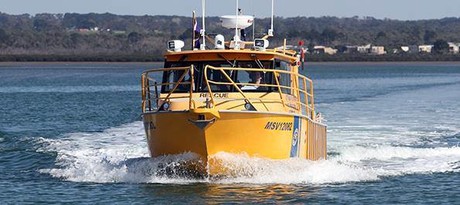Keeping Melbourne's waterways safe

Sandringham Coast Guard (VF12) on Melbourne’s Port Phillip Bay responded to more than 17,000 radio calls for assistance in 2017.
That’s on top of an average of 10,000 phone calls per year, all managed by a team of volunteers who contributed 6706 hours of their time last year.
VF12 is led by Commander Jennifer Newton, who is in charge of more than 30 volunteers who monitor three radiofrequency bands from 15 stations.
The unit conducts two shifts — from 7 am until 10 pm in summer, or 8 pm in winter — plus there is overnight phone monitoring from volunteers at home.
Those volunteers range from young university students to recently retired professionals.


In 2017, VF12 assisted 619 vessels and monitored a further 2541 via an offshore tracking system called Safetrx.
“When answering a radio call for assistance, we ask questions to gain all the information needed to locate the vessel. Often determining the location can be where the operator’s skill and knowledge is paramount. The people on board, the type of vessel, the current difficulty, where they are from and contact details are all needed,” Newton said.
“Once approved by the Water Police, a suitable vessel is then dispatched to help the distressed vessel and the progress is monitored from the control centre.”
Newton added that apart from navigation skills, volunteers also need wide-ranging knowledge in a variety of areas.
“Calls can range from boats needing more fuel to breakdowns, injured wildlife or mothers wanting advice about whether it is safe to take babies out on a boat,” she said.
“Sometimes we get calls from people on a beach reporting a dangerous jet ski. The public know our number and rely on us to resolve their problems.”

Radio operator training takes nine months, and volunteers have three tiers — Radio Operator, Radio Officer and Duty Officer, with the latter having the theory skills of Skippers in Navigation and Search and Rescue.
According to Newton, not many people realise the vital nature of work the volunteer radio operators do.
“The radios need to be monitored every day by a small team of volunteers; if no-one is listening, no-one will come,” she said.
“I am incredibly proud of my flotilla and all the volunteer hours they put in; I just hope there is more awareness and appreciation of the work we do.”
Please follow us and share on Twitter and Facebook. You can also subscribe for FREE to our weekly newsletter and bimonthly magazine.
5G drones deliver live images from emergencies
Timely images allow emergency responders to gain an early impression of the situation and provide...
NZ emergency services approach cyclone season with better comms
Emergency services will face this cyclone season with improved cellular communications...
Triple Zero Custodian Bill passes, as Senate inquiry looms
With an open inquiry into Optus and the Triple Zero ecosystem just days away, new legislation has...



